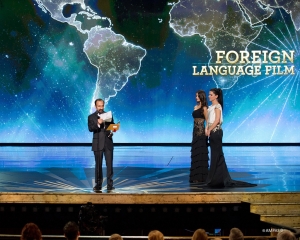KONY 2012: Public Diplomacy’s Perfect Storm
On March 5, 2012, Invisible Children, a San Diego-based non-profit organization, posted Why has this short film attracted both praise and opprobrium? KONY 2012 seeks to capture and distill the key elements of public diplomacy’s perfect storm, a complex problem set that involves both state and non-state actors joined in battle using the tools of hard and soft power. Where else can you find a comparable cast of characters? The storm raging around KONY 2012 includes the Lord’s Resistance Army (LRA), an international terrorist organization which has been brutalizing the peoples of East and Central Africa for years, and Invisible Children, a U.S. non-governmental organization committed “to stop LRA violence and support the war-affected communities in East and Central Africa.” In addition, our tempest contains approximately 100 U.S. military advisors reportedly equipped with predator drones working in concert with regional forces to bring Kony and the LRA to justice. Finally, this squall is set in a volatile region of the planet engulfing civilian populations in the Central African Republic, the Democratic Republic of the Congo, South Sudan and Uganda.
On July 8, 2005, Joseph Kony became the first person in the world to be indicted by the International Criminal Court for crimes against humanity including abduction, rape, and sexual slavery, among others. Critics note that KONY 2012 is an oversimplified clarion call urging American youth to do something to end the LRA’s decades-long reign of terror. Cronin-Furman and Taub note that “campaigns that focus on bracelets and social media absorb resources that could go toward more effective advocacy, and take up rhetorical space that could be used to develop more effective advocacy…No Ugandans or other Africans are shown offering policy suggestions in the film, and it is implied that local governments were ineffective in combating the LRA simply because they didn’t have enough American assistance.
Can bracelets and posters stop assault weapons and fear? According to Winograd and Hais, “most members of the Millennial generation (those born between 1982 and 2003) believe viral videos can make a measurable difference in the world. And despite its creator’s recent tribulations, the most viral video in Internet history, Kony 2012, is giving them a chance to prove they’re right.” Members of Generation X and the Boomers are inclined to think that a much more robust policy approach is necessary and, it would seem, that the producers of KONY 2012 recognize the need. According to Invisible Children, “our advocacy message has changed to reflect needs as communicated by community leaders and our Ugandan and central African leadership in the region… our advocacy work has culminated in the LRA Disarmament and Northern Uganda Recovery (A)ct which reflects sentiments from both currently affected communities and northern Uganda where the conflict is no longer kinetic. The bill supports recovery and reconstruction efforts and transitional justice institutions in northern Uganda, which has wide support in the Ugandan public.”
Time will tell whether KONY 2012 provided the requisite tools, both online and off line, to bring an international terrorist to justice and to begin the healing process that communities in Uganda, the Central African Republic, the Democratic Republic of the Congo and South Sudan so desperately want and need.
________________________________________________________
A statement from Invisible Children drafted specifically for this issue of PDiN Monitor follows:
Our advocacy, whether geared towards the United States government or international institutions, all stems from our relationships and work with local leaders in Uganda, the Democratic Republic Congo (DR Congo), South Sudan and the Central African Republic (CAR). Our advocacy message has changed to reflect needs as communicated by both community leaders and our Ugandan and central African leadership in the region. In 2007-2008 during the height of the Juba Peace Talks, Invisible Children and our partners lobbied the US government for increased involvement in the process. This effort led to the appointment of a Special Envoy, Tim Shortley, to participate in the process. Most recently, our advocacy work has culminated in the Lord’s Resistance Army Disarmament and Northern Uganda Recovery act, which reflects sentiments from both currently affected communities and northern Uganda where the conflict is no longer kinetic. The bill supports recovery and reconstruction efforts and transitional justice institutions in northern Uganda, which has wide support in the Ugandan public. In currently affected regions, the bill supports the apprehension of top LRA leadership, expansion of civilian protection mechanisms and support to the DDR/RR process, which facilitates the peaceful surrender and reintegration of LRA combatants. Our entire advocacy is driven by our program leaders on the ground, who are local leaders themselves, and our advocacy meetings in the region which, most recently, was demonstrated by an October summit of regional leaders from Uganda, DR Congo, South Sudan and CAR where the issues raised are echoed in our Kony 2012 advocacy message.
________________________________________________________
EDITORS NOTE: To read CPD’s blogs on this topic by Rob Kelley and APDS Blogger Marissa Cruz as well as all related PDiN headlines, click here.
Tags
Most Read CPD Blogs
-
January 20
-
January 2
-
December 15
-
December 17
-
December 17
Visit CPD's Online Library
Explore CPD's vast online database featuring the latest books, articles, speeches and information on international organizations dedicated to public diplomacy.









Add comment